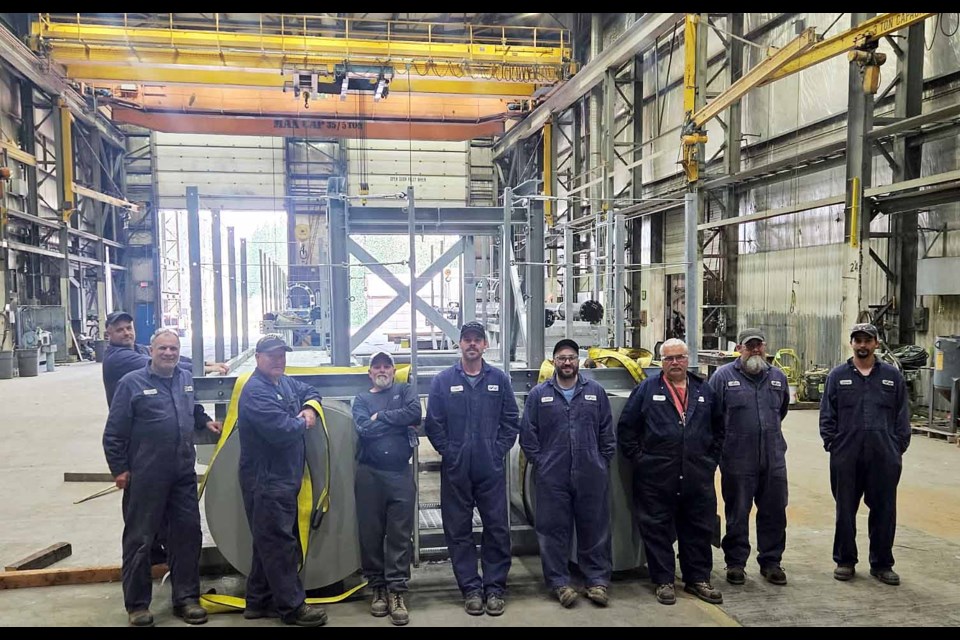That Trumpian dark cloud threatening the survival of Canadian companies has not left Prince George unscathed.
According to Northern Steel general manager Ken Bird, the threat of tariffs from the United States may have played a role in the parent company’s decision to permanently shut down Northern Steel, a Prince George business since 1977.
“Tariffs did not have a direct influence on the decision to close Northern Steel,” Bird said.
“That said, sectors such as forestry — which have been affected by tariffs — have seen broader industry impacts, particularly in regions like Prince George and across BC. This downturn has had a knock-on effect on the demand for industrial fabrication services.”
Northern Steel had 16 shop workers and six office staff when the facility closed on May 30. Eight employees remained to oversee the auction of equipment, which was completed Wednesday (July 23). They will stay with the company until the end of the month.
During the pandemic, the company employed as many as 60 people, and as recently as last year there were two shifts working. Bird said the company tried to find a buyer for Northern Steel, but there were no takers.
“This was an extremely difficult decision, made only after considerable efforts to return the business to sustained profitability,” Bird said. “Despite those efforts, persistent economic challenges — including a contracting forestry sector, limited local demand and rising cost pressures — made continued operations unviable.
“In addition, Prince George’s geographic location added significant freight-related costs, making it difficult to compete with businesses in larger markets.
“This is not the outcome we wanted for the business, and it is in no way a reflection on the dedication or performance of the Northern Steel team. Their efforts have been unwavering, and we deeply respect and appreciate all they have contributed.
“Over the years, we have had the privilege of employing many people in Prince George and have built lasting relationships, connections and projects we are proud of. We are especially grateful to our teams and the community for their support throughout our history.”
Northern Steel began by using plate steel to build fabricated and machined components for the forest industry. It later expanded into producing stainless steel pressure vessels and infrastructure for the oil and gas, pulp and paper, chemical and energy sectors.
In recent years, the company built chutes and hoppers for mining projects. Some of its work is now part of Conuma Resources’ Quintette coal mine near Tumbler Ridge, Artemis Gold’s Blackwater mine south of Vanderhoof, and B2Gold’s Back River Goose project in Nunavut.
“We were busy last year, and we were successful — we had some great projects — but it wasn’t enough,” said Northern Steel project manager Christina Lehtila. “This (closure) has kind of been in the works for a number of years, is my understanding.
“It’s going to affect the community, for sure, in many ways. All of our vendors — we had paint companies, safety suppliers, the gas for our welders. When we were busy, we had some of the local companies subcontract for us. We have guys on the floor — one of them has been here 40 years.”
Lehtila said market uncertainty triggered by Trump’s tactics likely convinced some clients to delay major projects.
“The tariffs aren’t helping. I don’t know if that was the primary reason, but it pushed us over the edge, I would say,” she said.
“With no purchase orders coming in, everybody held off on bidding. I suspect had we received a big bid at the beginning of the year, this would have remained open longer.”
The company owns the lot at 9588 Milwaukee Way, as well as an adjacent property that’s also up for lease in the Danson Industrial area.
Fritz Hausot took over the company shortly after it opened in 1977 and ran Northern Steel for more than three decades before selling it in 2011 to Ontario-based Canerector Inc. Fritz died in 2023. His son Fred Hausot, nephew Gary and niece Sylvia Graf were working at Northern Steel when it closed.
Gary Hausot, a journeyman welder, had a busy day Wednesday helping coordinate the online auction and sell off remaining assets.
“A facility like this — we’re probably one of the biggest fabricating shops north of Vancouver — the overhead crane capacity was probably the biggest thing we had going here,” said Hausot. “We had a height of 35 feet we could go to with our cranes inside, and the combined capacity in the main bay between the two was 60 tonnes.
“We did work for pretty much every industry.”
The 59-year-old has worked at Northern Steel for 28 years and isn’t ready to retire just yet.
“I’m on the Freedom 75 program,” Hausot joked. “I got a few irons out there and I shouldn’t have any issue finding something else — but like anything, if you’ve been in it this long, you get comfortable in the routine and you work your way to the top of the seniority list.”
Mark Becker worked as a fabricator for 18 years. He’s found another job in the city, but said he didn’t want to leave.
“It’s sad because it’s a lot of people, and it’s a trickle-down effect to the steel suppliers who aren’t going to be seeing us anymore — Varsteel, A.J. Forsyth, Northern Metalic, the paint-supply companies. A lot of people are going to be affected,” said Becker.
“I’ve already landed another job and I’ll be alright, but some of the other guys will have trouble finding work because the steel shops in town right now are pretty slow. The economy is kind of tailing down. Trump slapped more tariffs on aluminum and steel, so everybody is kind of putting everything on pause.”


